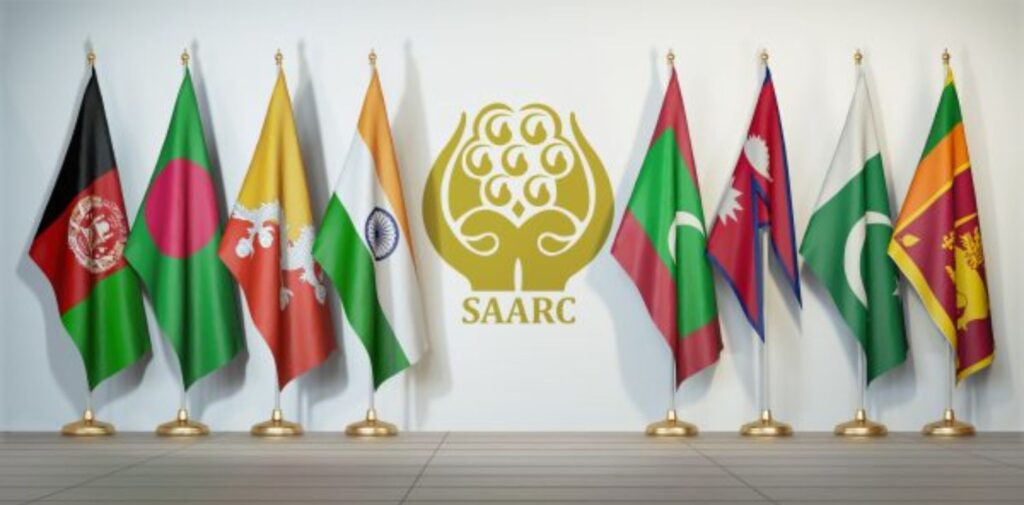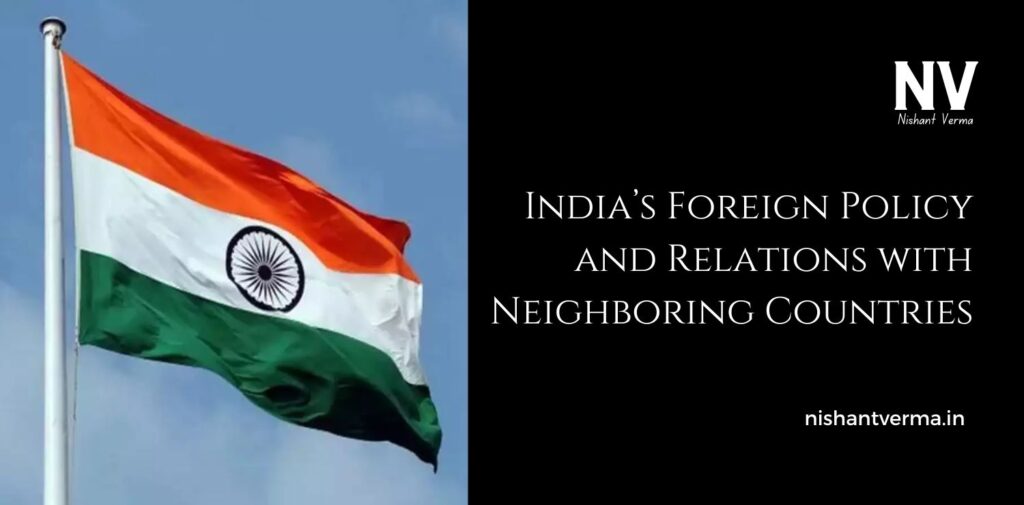India, a vast and diverse country, has always been keen on maintaining peaceful and strong relations with its neighboring countries. Its foreign policy plays a big role in shaping how it interacts with the world, especially with countries that share a border with it. India’s relationships with neighboring countries are vital for both security and economic growth. In this article, we will explore India’s foreign policy and how it manages its relations with countries like Pakistan, China, Nepal, Sri Lanka, Bangladesh, Bhutan, and Myanmar.
What is Foreign Policy?
Foreign policy is the way a country deals with other countries around the world. It is like the rules or decisions that a country follows when interacting with its neighbors and other nations. These rules can cover many things, such as trade, security, diplomacy, and helping other countries in times of need. For India, its foreign policy focuses on creating friendly relations, ensuring national security, promoting peace, and strengthening the country’s position globally.

India’s Foreign Policy: A Brief Overview
India’s foreign policy has always been shaped by its history, geography, and values. After gaining independence in 1947, India adopted a policy of non-alignment. This meant that India did not want to take sides in the Cold War between the United States and the Soviet Union. India wanted to stay neutral and focus on its own development and peaceful coexistence with other nations. Over time, India’s foreign policy evolved, but its main goals remained the same: peace, security, and development.
Today, India’s foreign policy focuses on maintaining good relationships with neighboring countries while also playing an active role on the world stage. India’s government works to strengthen its defense, promote economic growth, and support peace and stability in the region.
India’s Relations with Its Neighboring Countries
Relations with Pakistan
India shares a long border with Pakistan, and the two countries have a complex relationship. They have had many disagreements, especially over the region of Kashmir, which both countries claim as their own. There have been wars and conflicts between India and Pakistan in the past, and tensions continue to simmer, especially in Kashmir.
Despite these challenges, India has made efforts to improve relations with Pakistan through dialogue and peace talks. Both countries have also cooperated on issues like trade and combating terrorism. However, deep-rooted differences still remain, and it is important for both nations to continue working toward peace and resolving their issues through talks rather than violence.
Relations with China
India shares a long border with China, and the two countries are among the largest in the world. Like Pakistan, India and China have had disputes, especially over areas like Aksai Chin and Arunachal Pradesh. There have been border clashes between the two nations in the past, most recently in 2020, when tensions rose again over a border standoff.
However, India and China also have strong economic ties, with China being one of India’s biggest trading partners. India exports many goods to China, such as agricultural products, minerals, and chemicals. Despite their differences, both countries continue to engage in diplomatic talks to avoid further conflict and strengthen their trade relations.
Relations with Nepal
India and Nepal have always had close historical, cultural, and geographical ties. Nepal is a landlocked country that lies between India and China, and it shares a long border with India. Both countries have friendly relations, with India providing Nepal with support in terms of trade, infrastructure, and development assistance.
However, there have been some disagreements in recent years, mainly over border issues. Nepal released a new map in 2020 that included areas disputed with India. Despite this, both countries have been working to resolve these issues through diplomacy. India and Nepal continue to share strong people-to-people connections, as many Nepalese people live and work in India, and vice versa.
Relations with Sri Lanka
India and Sri Lanka have a close relationship, mainly due to their shared history and cultural ties. Sri Lanka is an island nation to the south of India, and both countries have many shared traditions, especially in terms of religion and language. India has been a key supporter of Sri Lanka’s development, providing financial and humanitarian assistance over the years.
However, there have been some tensions, particularly concerning Sri Lanka’s treatment of the Tamil minority, a community with cultural and historical ties to India. India has played an important role in encouraging Sri Lanka to address these issues and ensure the protection of minority rights. Despite some challenges, the two countries continue to cooperate in areas such as trade, tourism, and security.
Relations with Bangladesh
India shares a long border with Bangladesh, and the two countries have a friendly and cooperative relationship. Bangladesh was once part of India before gaining independence in 1971, and the two nations share deep cultural and historical ties.
India has been a strong supporter of Bangladesh’s development and has helped with various projects in areas like education, healthcare, and infrastructure. The two countries have also worked together on issues like border security, trade, and water-sharing agreements. While there have been some differences, especially over the sharing of river waters, India and Bangladesh continue to maintain strong diplomatic relations.
Relations with Bhutan
India’s relationship with Bhutan is one of the closest and most friendly in South Asia. Bhutan is a small, landlocked country located to the northeast of India, and it has long depended on India for economic and security support. India has provided Bhutan with assistance in areas like education, healthcare, and infrastructure.
The two countries share a close political and cultural bond, and India plays a major role in Bhutan’s defense and security. Bhutan has also relied on India for its foreign policy, and the two nations work together on various regional issues. Bhutan is considered one of India’s closest allies in the region.
Relations with Myanmar
Myanmar, which lies to India’s east, is an important neighbor with which India shares historical, cultural, and economic ties. India has been working to strengthen its relationship with Myanmar, especially in terms of trade, security, and infrastructure development.
India has supported Myanmar’s development by helping with projects such as road construction and energy production. However, Myanmar’s internal political issues, including the military coup in 2021, have created challenges for India in its relations with the country. India continues to engage diplomatically with Myanmar and has called for peace and stability in the region.

India’s Role in Regional Cooperation
India has always played an active role in regional cooperation, not just with its neighbors, but also with other countries in South Asia. India is a founding member of the South Asian Association for Regional Cooperation (SAARC), an organization aimed at promoting regional cooperation and improving the economies of South Asian countries. India also works closely with the Bay of Bengal Initiative for Multi-Sectoral Technical and Economic Cooperation (BIMSTEC), which includes countries from South Asia and Southeast Asia.
India also works with other regional powers like Japan, the United States, and Russia to ensure stability and peace in the region. India’s involvement in these regional groups highlights its commitment to creating a peaceful and prosperous neighborhood.
Challenges and Opportunities
India’s foreign policy with its neighboring countries is shaped by both opportunities and challenges. The challenges include ongoing border disputes, political instability in some neighboring countries, and the need to balance relationships with powerful neighbors like China. However, India has opportunities to expand its influence by promoting regional peace, investing in infrastructure, and strengthening trade ties.
India’s commitment to peace, security, and cooperation will continue to play a key role in shaping its relations with neighboring countries. By working together, India and its neighbors can build a future of prosperity and mutual respect.

Conclusion
India’s foreign policy and relations with its neighboring countries are crucial for the country’s development and security. India faces challenges in its relationships with some neighbors, but it continues to focus on diplomacy, cooperation, and peaceful resolution of conflicts. Through regional partnerships and economic cooperation, India aims to build stronger ties with its neighbors and contribute to stability and growth in the region.
As India moves forward, its foreign policy will play an even more important role in shaping its position on the global stage, ensuring that it remains a powerful, peaceful, and prosperous nation.




